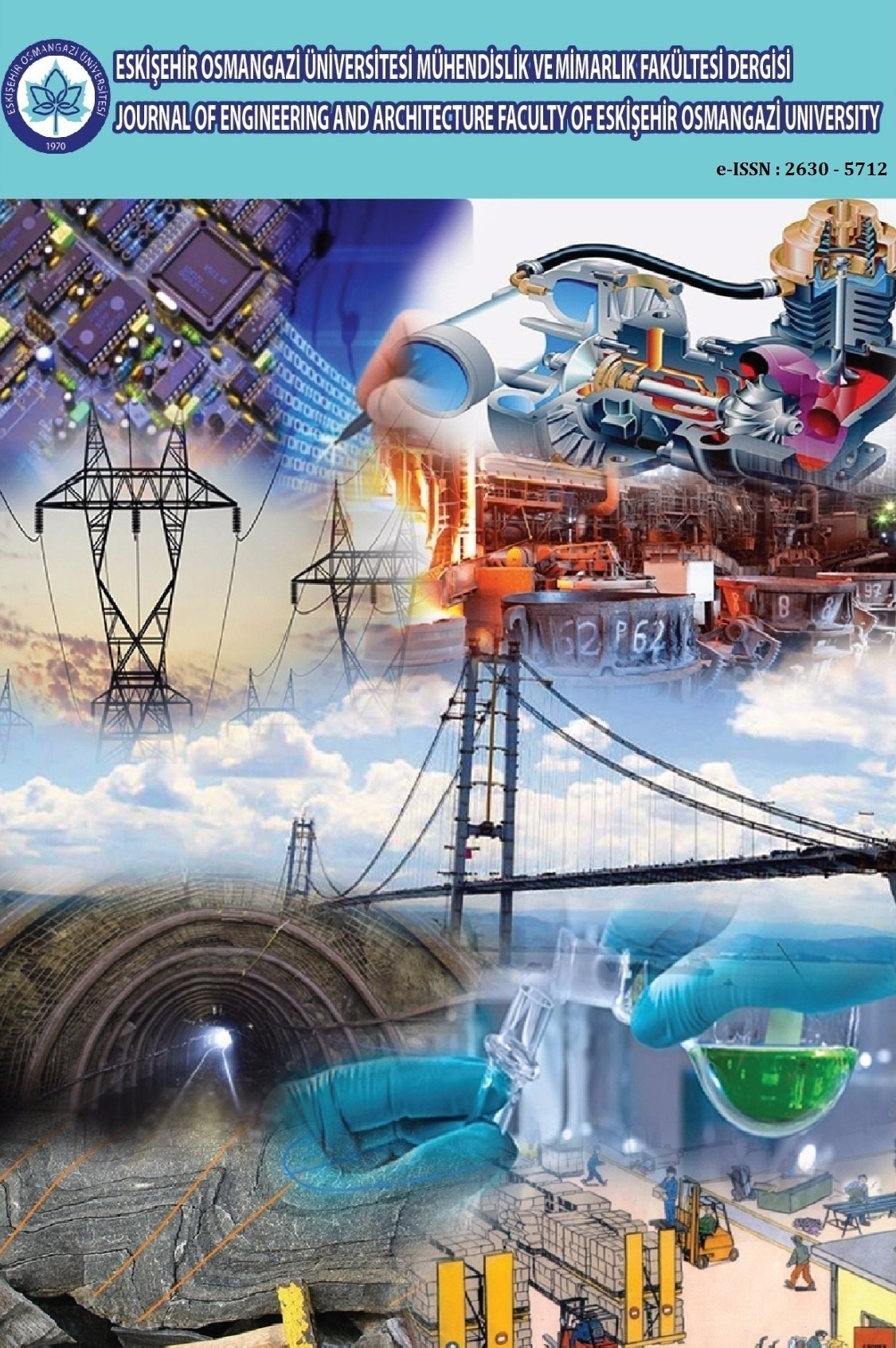Harran Kili Şişme Potansiyelinin Belirlenmesinde Yapay Sinir Ağları Ve Çoklu Regresyon Modellerinin Kullanımı
Sisen zemin, yapay sinir ağları, çoklu regresyon.
Determination Of Swelling Potential Of Harran Clay Using Artifıcial Neural Network And Regression Models
Swelling soil, artificial neural network, multiple regression,
___
- [1] J.C., Parker, D.F., Amos and D.L., Kaster, “An evaluation of several methods of estimating soil volume change”, Soil Science Society of America Journal, Vol.41, pp.1059-1064, 1977
- [2] F.H., Chen, “Foundation on Expansive Soils”, Elsevier, Amsterdam, The Netherlands, 1988.
- [3] A.A.,Basma, A.S., Al-Hamoud, and A., Husein, “Laboratory assessment of swelling pressure of expansive soils”, Applied Clay Science 9, pp.355-365, 1995.
- [4] W.S., Abdullah, K.A., Alshibli, and M.S., Al-Zou’bi, “Influence of pore water chemistry on the swelling behavior of compacted clays”, Applied Clay Science, 15, pp.447-462, 1999.
- [5] A.A., Al-Rawas, R., Taha, J.D., Nelson, T.B., Al-Shap, and H., Al-Siyabi, “A comparative evaluation of various additives used in the stabilization of expansive soils”, Geotechnical Testing Journal, GTJODJ, Vol. 25, No.2, pp. 199-209, 2002.
- [6] Y., Du, S., Li, and S., Hayashi, “Swell–shrinkage properties and soil improvement of compacted expansive soil, Ning-Liang Highway, China”, Engineering Geology, 53 , pp.351-358, 1999.
- [7] H., Tosun, M., Türköz, Đ., Zorluer, ve A., Arslan, “Sıkısma kontrolü ile sisme potansiyelinin önlenmesi ve Harran killerinde (V.kısım) yapılan uygulamalar”, 3.GAP Mühendislik Kongresi, Bildiriler Kitabı, s.425-432, 24-26 Mayıs 2000, Sanlıurfa.
- [8] Y. E.-A., Mohamedzein, R., Ibrahim, and A., Alsanosi, “Prediction of swelling pressure of expansive soils using Neural Networks”, Expansive Soils: Recent advances in characterization and treatment, Ed. Al-Rawas, A.A.,and Goosen,F.A., Chapter 17, pp.245-256, 2007.
- [9] A. T. C., Goh, “Empirical design in geotechnics using neural networks.” Geotechnique, 45(4), pp.709-714, 1995b. [10] A. T. C., Goh, K. S., Wong, and B. B., Broms, “Estimation of lateral wall movements in braced excavation using neural networks.” Canadian Geotech. J., 32, pp.1059-1064, 1995.
- [11] Y. M., Najjar, and H. E., Ali, “CPT-based liquefaction potential assessment: A neuronet approach.” Geotechnical Special Publication, ASCE, 1, pp.542-553, 1998.
- [12] H. TOSUN, “Hafif su yapıları açısından sızan killerin önemi ve bir uygulama” Mühendislik Jeolojisi Türk Milli Komitesi Dergisi, sayı:14, s:94-109, 1992.
- [13] J.A, Anderson, “Cognitive and psychological computation with neural models”, IEEE Transactions on Systems, Man and Cybernetics, V.SMC-13, pp:799-814, 1983.
- [14] S.W., Liu, J.H., Huang, J.C., Sung, and C.C., Lee, “Detection of cracks using neural networks and computational mechanics”, Computer Methods in Applied Mechanics Engineering ;191, pp.2831-2845, 2002.
- [15] J.J., Hopfield, “Neural networks and physical systems with emergent collective computational abilities”, Proc. Nat. Acad. Sci., 79, pp.2554-2558, 1982.
- [16] P.J., Thomas, J.C., Baker, L.W., Zelazny, and D.R.,Hatch, “Relationship of map unit variability to shrink-swell indicators”, Soil Sci. Soc. Am. J., Vol.64, pp. 262-268, 2000.
- [17] A., Komornik, and D., David, “ Prediction of swelling pressure of clays”, Journal of SMFE Div., ASCE, Vol. 95, No. SM1, pp. 209-225, 1969.
- Yayın Aralığı: Yılda 3 Sayı
- Başlangıç: 1986
- Yayıncı: Eskişehir Osmangazi Üniversitesi
Borlanmış AISI 1030 Celiğinin Abrazif Aşınma Özellikleri
Osman Nuri ÇELİK, Ömür AKBAYIR, Hakan GAŞAN, Ümit ER, Necdet AYDINBEYLİ
An Investigation Of Amorphization In Fe-Al Alloys During Mechanical Alloying
Hakan GAŞAN, O.nuri ÇELİK, Nedret AYDINBEYLİ
Yüksek-Düşük Kireçli Uçucu Kül İçeren Betonların Basınç Dayanımının YSA Ve BM Kullanarak Tahmini
İlker Bekir TOPÇU, Mustafa SARIDEMİR
Kendiliğinden Yerleşen Betonun Özellikleri
İlker Bekir TOPÇU, Turhan BİLİR, Hasan BAYLAVLI
Bor Madeni İşletmeciliğinde Verimlilik Ve Karlılık
Betonarmede Donatı Ve Beton Arasındaki Aderansa Korozyonun Etkisi
İlker Bekir TOPÇU, Ahmet Raif BOĞA
Çeneli Kırıcıda Ufalanan Kromitlerin Tane Sekil Karakterizasyonu
Adem TAŞDEMİR, Bahri ÖTEYAKA, Hüseyin ÖZDAĞ
Görüntü İstatistiklerinden Faydalanarak LBG Algoritmasının Güncellenmesi
Slempe Arıtım Tesisi Atığı Kondensatın Özütleme Yontemi İle Değerlendirilmesi
